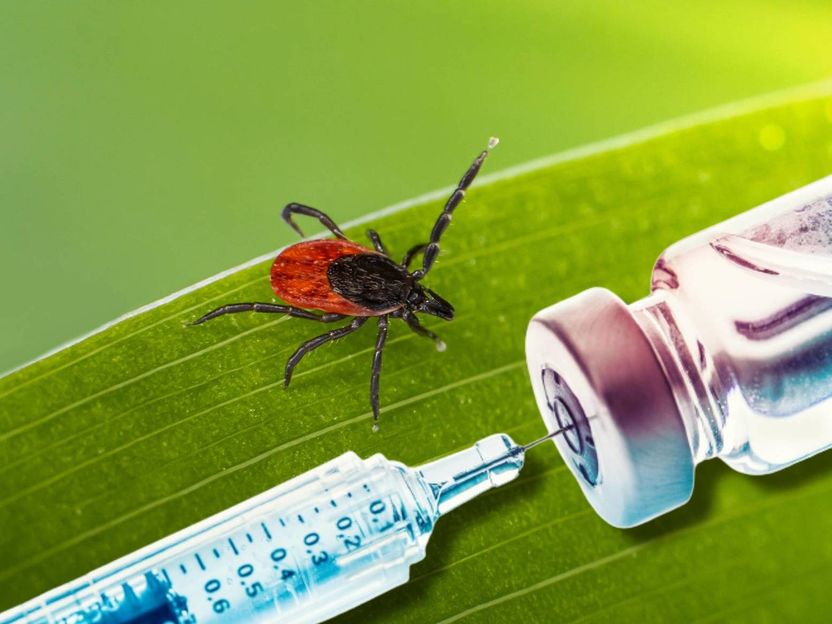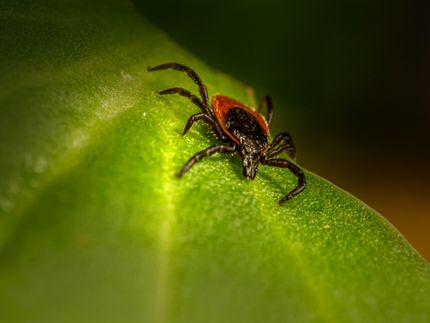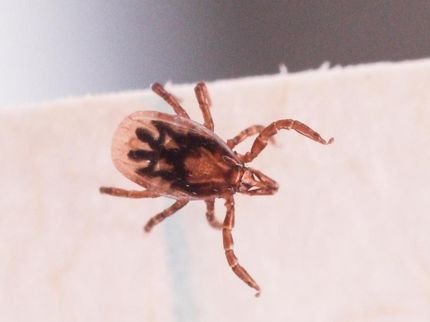Novel Lyme vaccine shows promise
The vaccine is delivered by the same mRNA technology that has proved so effective against COVID-19
Yale University researchers have developed a novel vaccine that in guinea pigs offers protection against infection by the bacterium that causes Lyme disease and may also combat other tick-borne diseases, they report Nov. 17 in the journal Science Translational Medicine.

Symbolic image
pixabay.com
Instead of triggering an immune response against a particular pathogen, the new vaccine prompts a quick response in the skin to components of tick saliva, limiting the time ticks have to feed and infect the host, the study shows. The vaccine is delivered by the same mRNA technology that has proved so effective against COVID-19.
In the United States, at least 40,000 cases of Lyme Disease are reported annually but the actual numbers of infections could be 10 times greater, researchers said. In addition, other tick-borne diseases have also spread in many areas of the U.S.
“There are multiple tick-borne diseases and this approach potentially offers more broad-based protection than a vaccine that targets a specific pathogen,” said senior author Erol Fikrig, the Waldemar Von Zedtwitz Professor of Medicine (infectious diseases) and professor of epidemiology (microbial diseases) and of microbial pathogenesis. “It could also be used in conjunction with a more traditional pathogen-based vaccine to increase their efficacy.”
The saliva of the black-legged tick Ixodes scapularis (I. scapularis), which transmits the Lyme Disease pathogen Borrelia burgdorferi (B. burgdorferi) contains many proteins, and the investigators have focused on 19 separate proteins.
Yale researchers, in collaboration with Drew Weissman’s team at the University of Pennsylvania, used bits of mRNA that produce all 19 of the saliva proteins as the basis of a vaccine, the same strategy used in vaccines that effectively combat the SARS-Cov-2 virus. They tested the vaccine on guinea pigs, which can be infected with the Lyme disease agent and have also been used as a model to study tick resistance.
Compared to non-immunized guinea pigs, vaccinated animals exposed to infected ticks quickly developed redness at the tick bite site. None of the immunized animals developed Lyme Disease if ticks were removed when redness developed. In contrast, about half of the control group became infected with B. burgdorferi after tick removal. When a single infected tick was attached to immunized guinea pigs and not removed, none of vaccinated animals were infected compared to 60 percent of control animals. However, protection waned in immunized guinea pigs if three ticks remained attached to the animal. Ticks in immunized animals were unable to feed aggressively and dislodged more quickly than those on guinea pigs in the control group.
“The vaccine enhances tick recognition, partially turning a tick bite into a mosquito bite,” Fikrig said. “When you feel a mosquito bite, you swat it. With the vaccine, there is redness and likely an itch so you can recognize that you have been bitten and can pull the tick off quickly, before it has the ability to transmit B. burgdorferi.”
Researchers also noted a caveat in their findings. Mice, which lack the ability to acquire natural tick resistance after infection, were not protected against Lyme Disease after vaccination. In contrast to guinea pigs, mice are a natural reservoir for I. scapularis ticks, and the ticks may have evolved to develop ways to specifically feed repeatedly on mice. Another possibility may be that guinea pig skin, like human skin, is more layered than the skin of mice.
Fikrig said more study is needed to discover ways proteins in saliva can prevent infection. Ultimately, human trials would need to be conducted to assess its efficacy in people.
Original publication
Other news from the department science

Get the life science industry in your inbox
By submitting this form you agree that LUMITOS AG will send you the newsletter(s) selected above by email. Your data will not be passed on to third parties. Your data will be stored and processed in accordance with our data protection regulations. LUMITOS may contact you by email for the purpose of advertising or market and opinion surveys. You can revoke your consent at any time without giving reasons to LUMITOS AG, Ernst-Augustin-Str. 2, 12489 Berlin, Germany or by e-mail at revoke@lumitos.com with effect for the future. In addition, each email contains a link to unsubscribe from the corresponding newsletter.
More news from our other portals
Last viewed contents
Johnson & Johnson Announces $10 Billion Share Repurchase Program
Naturopathic_medicine
Brain tumor growth can be slowed, new study suggests
Is surgery the only option for meniscal tear and osteoarthritis? - New research finds that for a number of patients physical therapy provides similar improvements in physical function and pain
Camouflaging of viral DNA could be crucial step in progression of cancers
Lisuride sc infusion therapy has proved highly effective in reducing severe motor complications in patients with Parkinson
Galapagos receives €7.4 M milestone in arthritis alliance with GlaxoSmithKline
Genomatica Extends Research Agreement With Dow Chemical - For Next Generation Microbial Expression Technology using SimPheny(TM)
























































